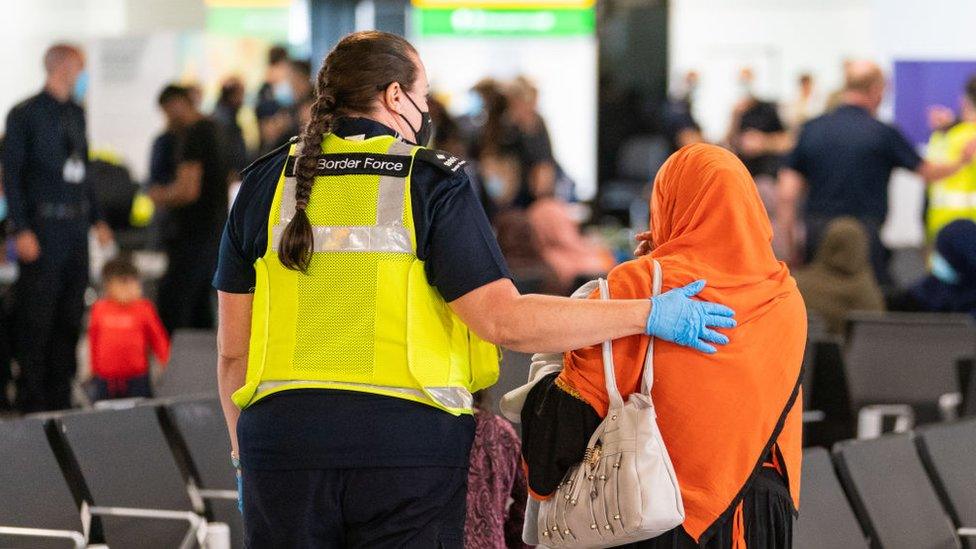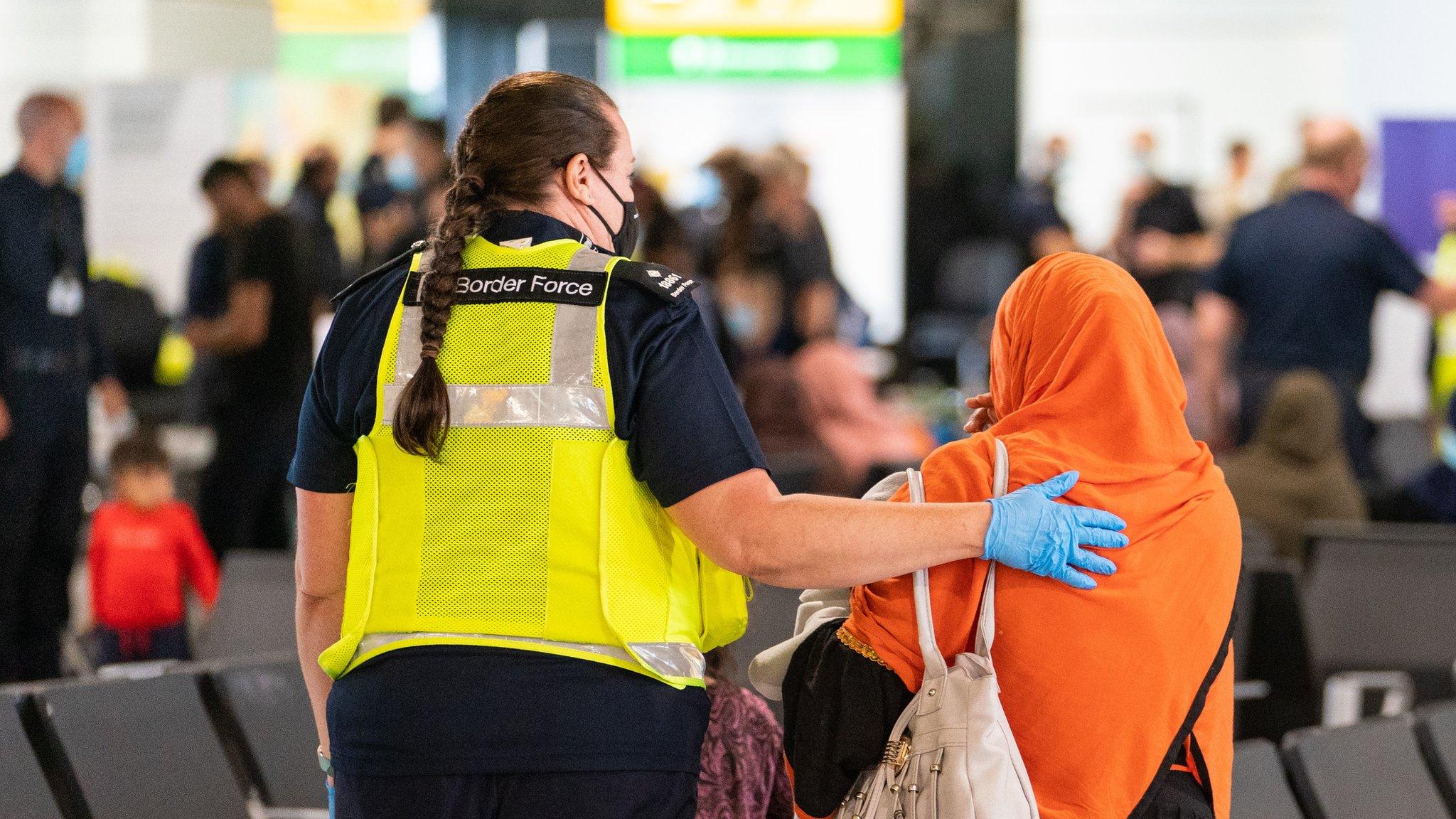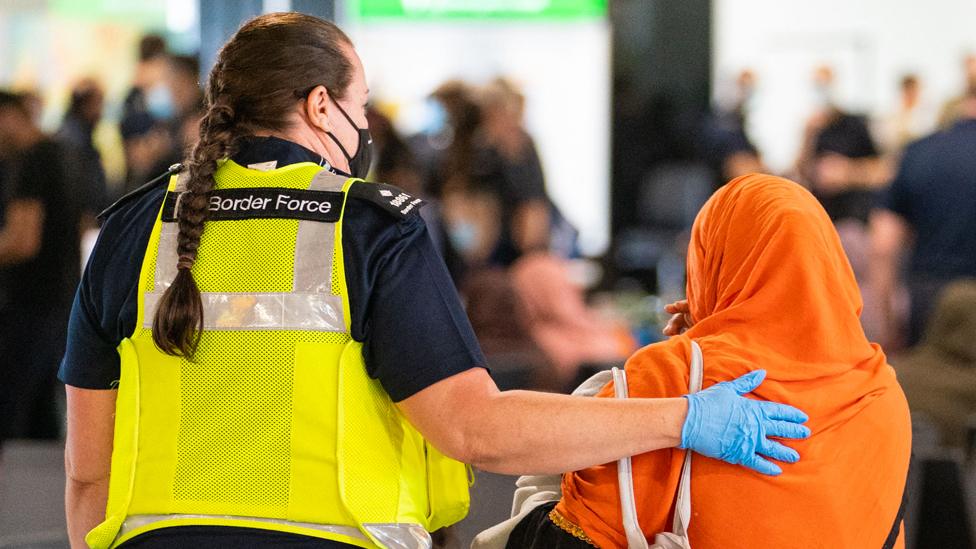Afghan refugees worried over UK visas, lawyers warn
- Published

Fears are growing that some Afghan refugees evacuated to the UK last summer are on the verge of being treated like illegal immigrants because they have not received updated papers.
Solicitors say it's unclear how many Afghans are missing documents they need to legally work and rent homes.
They say they have heard nothing about their status, days before temporary visas will expire.
The Home Office has hit back saying the warning is needless scaremongering.
When the UK evacuated some 15,000 Afghans to the UK last August, the Home Office issued six-month visas to the refugees, with a view to giving them a permanent right to settle later on.
That commitment still stands as part of the resettlement plan.
But the Law Society, which represents solicitors, said firms across the UK are now receiving calls for help from people whose temporary legal status expires in the coming week - meaning they have no means of proving they are lawfully in the country.
In each case, Afghans are saying they have not received any updated papers or they are struggling to get answers from officials.
It is not clear how many Afghans are affected.
Despite two recent parliamentary questions, ministers have not revealed how many of the evacuees have been granted their final permanent status - but they have said they "aim" to conclude the process before current visas expire.
However, under the law, immigrants must be able to show on request a valid visa to rent a home, work or claim benefits, open a bank account and use all of the NHS.
If they cannot produce a valid visa whenever it is requested, they can be denied services. These laws were introduced in the last decade to put pressure on illegal migrants and over-stayers - a policy that faced damning criticism when it led to unjust treatment in the Windrush scandal.
One Afghan, who was evacuated after working for the UK and its allies for almost 20 years, told BBC News that he was increasingly concerned about his status.
The fluent English speaker has found himself a new home and begun applying for jobs - but employers have repeatedly refused to take him on amid uncertainty about his long-term right to be in the UK.
"Since the end of September, I haven't heard anything from the Home Office," he said.
"My visa will expire on 26 February. I have tried to contact them - sending emails to the Afghan resettlement scheme people.
"But I haven't received any response. It's almost six months.
"I really don't know what will happen to me. By the law, they have to give me a visa before the expiration of this visa. But I don't know what's the government's plan. What will they do with us?"
I. Stephanie Boyce, president of the Law Society, said solicitors were appealing urgently for more information from the Home Office.
She said they had been trying to get clarity for months and feared their clients would become overstayers by omission - facing possible homelessness and destitution.
"The Home Office must urgently provide every one of these people with evidence of their continued right to work, study and rent accommodation," she said.
"The UK's 'warm welcome' is meaningless if the government does not provide concrete assurances which could allay the fears of thousands of people and give them the legal certainty they need."
In some cases, Afghans say they have received verbal assurances from officials that their paperwork will eventually come - and a spokesman for the Home Office accused lawyers of "needless scaremongering".
"The Afghan nationals resettled here already have the right to work, access to education, healthcare and can apply for public funds," he said.
"While we are in the process of granting all indefinite leave to remain, all have valid leave while this is ongoing, so to suggest they are at risk of losing their rights is completely wrong."

THOMAS SHELBY RETURNS: See what's in store for the final instalment of Peaky Blinders
THE LAST STONE: When Great Britain's women's curling team captivated the nation

Related topics
- Published15 August 2023

- Published2 September 2021

- Published1 September 2021

- Published31 August 2021

- Published26 August 2021